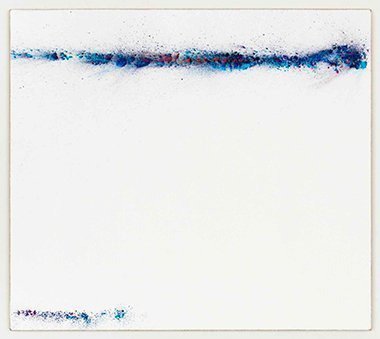Thilo Henizmann
dal 11/9/2015 al 16/10/2015
Segnalato da
11/9/2015
Thilo Henizmann
Galerie Emmanuel Perrotin, Paris
Detours, Hasards & Monsieur Heinzmann. For the exhibition the artist invokes detours and chance to gather an ensemble of works, each of which expresses a daring pictorial gesture, challenging chance not in order to abolish it but to celebrate it and thwart any formalism.

For his first exhibition at the Parisian location of Galerie Perrotin, Mr
Heinzmann invokes detours and chance to gather an ensemble of works,
each of which expresses a daring pictorial gesture, challenging chance
not in order to abolish it but to celebrate it and thwart any formalism.
“A throw of the dice will never abolish chance”. Mallarmé, fully aware
of his poetic means and of the Crisis of Modernity, threw these words
and shook the world of poetry with this incredible poem, scattered on
twelve double-page spreads, the words cascading, appearing in waves,
in explosion, in constellation out of a unanimous horizon, unanimously
white. Like Mallarmé, Thilo Heinzmann manipulates the means of
painting, pushed to do so by the demanding creative and poetic gesture
confronted to the void, the white backdrop of things, pushed to do so
also because of the desire to continue to make Painting the privileged
arena of encounters between physical substrates and the work on
colours and texture
The different substrates of surfaces vary, and with them the different
qualities and values of white vary too. When the substrate is canvas,
the painted surface is absorbent and dense, and almost frothy. Matt,
neat, too perfect, when the substrate is aluminium. Subtly conspicuous
when the support is wood, putting well forward what is exhibited to the
eye, noticeably those pieces of polystyrene, playing on the contrast
between natural and artificial materials. The quality of this material,
disposable and synthetic, as cut and stuck as it is on the plain white
surface, complicates the perception of the surface of Painting – surface
is neither neutral, nor flat, nor smooth, nor innocent. It complicates
also the notions of usage and finality of materials. Depending on the
material and visual qualities of the chosen substrates, Thilo Heinzmann
interferes and hence subverts the ideas of representation and utility,
defending the possibility of a suspension of utilitarian thinking and
perception focusing on actual sensations challenging clichés. There,
he works on the physical tension between wood and polystyrene. Here,
on the sensitive and visual sensations caused by the scratchy hessian,
wrinkled and stained. Over there, he plays with the feelings caused by
the vision of perforation, incision, laceration of the hard white metal.
He is encouraged to do it by the warm colours whose path on the
surface is followed and reinforced by the cuts through the surface. The
cuts keep the rhythm of the incisive gesture, leaving scars in the metal.
Pigment jets originate from the same gesture, evoking sensations of
detonation, energy and flashes. Glowing clouds have formed themselves
on the surface, making almost the sound of sand, of effervescent
powder, sparkling. The action of Painting takes power over the white,
over the power of its neat splendour. The work on the material elements
of painting achieves chemical operations which generate paradoxical
aesthetical and pictorial qualities, conveying the feeling instinctive
composition mostly minimalist.
Painting is facing here three of its conditions of possibility: chemical,
material and paradoxically hazardous: chances are taken with the
materials, with the physical reactions, with the gesture achieving precise
chance in the outcome. The gesture here has the audacity of putting
the historical tension between figurative and abstract painting in the
background, for the benefit of the sensory and actual tension between
texture, colour, the materiality of substrates and surfaces. Thilo Heinzmann
researches on the perceptual and visual elementary means of painting.
He is on the lookout. Either for capturing the mineral quality of pigments,
and to maintain their volatility and the brightness of their colour,
radiant and irradiated, fluorescent, witnesses and actors of the process
of transfiguration of light in colours. Or for trapping pigments in the
seductive epoxyde – compelling seduction of colour spreading out as
a pure material, activating the utopia of colour without form, without
object, inversing the traditional conceptual and metaphysical hierarchy
between Form and Matter.
Image: Thilo Henizmann , “O.T.” 2015 Oil and pigment on canvas, plexiglas cover. 83 x 93 x 8,5 cm / 32 3/4 x 36 1/2 x 3 1/4 inches. Photo: Roman März
Press Contact:
Thomas Chabaud, Press Officer, thomaschabaud@perrotin.com +33 1 76 21 07 11
Opening reception: Saturday 12 September, 4-9pm
Galerie Perrotin
76 rue de Turenne, Paris
Tue - Sat 11am to 7pm



